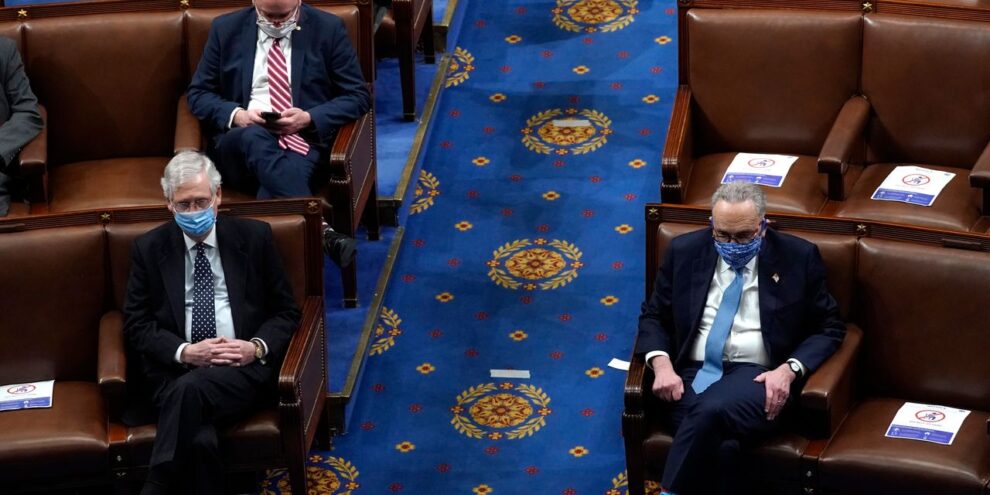
The soon-to-be Senate Majority Leader, Sen. Chuck Schumer, said Tuesday his priorities over “the next several weeks” include the impeachment trial of outgoing President Donald Trump, confirming President-elect Joe Biden’s high profile nominees and passing another coronavirus aid bill.
“So let me be clear: there will be an impeachment trial in the United States Senate. There will be a vote on convicting the president for high crimes and misdemeanors. And if the president is convicted, there will be a vote on barring him from running again,” Schumer said on the Senate floor in what is likely one of his last appearances as the chamber’s minority leader.
The Senate is currently made up of 51 Republicans, 46 Democrats and two Independents, Sen. Bernie Sanders of Vermont and Sen. Angus King of Maine, who caucus with the Democrats, effectively making it a 51-48 split in the GOP’s favor.
But with the expected swearing in of three Democratic senators Wednesday, Georgia runoff election winners Raphael Warnock and Jon Ossoff as well as new California senator Alex Padilla, the balance shifts to a 50-50 split. In combination with Vice President-elect Kamala Harris’ vote, Democrats will hold power and Schumer will become the new majority leader.
The split has its unique circumstances. The last time the chamber was evenly split was in 2000, when Republicans had effective control after then-Vice President Dick Cheney was sworn in. Like then, Schumer and his Republican counterpart Mitch McConnell will have to work out a powersharing agreement that sets out committee ratios, staffing levels and other aspects that usually skew to the majority’s side in a normal split.
Schumer also said Biden deserved to have some of his cabinet nominees put in place quickly, as he said was a courtesy extended to Trump and other presidents. To do that, the Senate will be in session following the presidential inauguration Wednesday, he said.
“With cooperation, we can confirm key national security nominees at State, the Department of Defense, Homeland Security, Treasury and intelligence community,” he said.
After “key nominees” are approved, Schumer said, the Senate will turn to another pandemic aid package, citing an increase in direct payments, money for vaccine distribution and financial help for state and local governments as high priorities.
Much of Schumer’s agenda will require cooperation from Senate Republicans to be achieved quickly, particularly confirmations and a big aid package. McConnell did not say how much he planned to go along with Schumer, but he hinted he agreed at least somewhat with Democrats who say Trump incited the insurrection at the U.S. Capitol Jan. 6, the subject of the House’s impeachment article.
“This mob was fed lies. They were provoked by the President and other powerful people. And they tried to use fear and violence to stop a specific proceeding of the first branch of the federal government which they did not like,” McConnell said.
Once the new senators are sworn in, Democrats would need 17 Republicans to cross over and vote to convict Trump . While that is a tall order, a few Republicans have already suggested they’re leaning toward conviction. If MConnell breaks against Trump, it could turn a trickle of GOP support for conviction into a stream.
Other Republicans have cited constitutional concerns, though, about convicting a president after he leaves office and the precedent it would set.
“I think there are serious questions about sort of trying a president after he’s already left office. It’s never happened before and maybe that’s for a good reason,” said Sen. John Cornyn of Texas.
Citing a case in the 1800s, many legal scholars say impeachment and conviction is within the bounds of the U.S. Constitution. The nonpartisan Congressional Research Service said in a Jan. 15 report, “Though the text is open to debate, it appears that most scholars who have closely examined the question have concluded that Congress has authority to extend the impeachment process to officials who are no longer in office.”
The timing of a Senate trial remains uncertain, though, as House Speaker Nancy Pelosi has yet to formally send the impeachment article to the Senate for consideration. “We’re doing inauguration now,” Pelosi said Tuesday, in declining to answer a question on the timing.











Add Comment